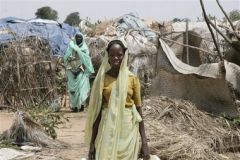Darfur displaced risk death if chased from camps
November 12, 2007 (WASHINGTON) — A prominent doctor who treats displaced people in Darfur says the Sudanese government is risking the deaths of hundreds of thousands by forcing people out of the camps where they receive humanitarian aid.
 Dr Mohamed Ahmed Abdallah, who runs a human rights group in south Darfur’s capital, Nyala, said he has seen evidence backing a recent U.N. claim that the government was chasing people out of nearby camps.
Dr Mohamed Ahmed Abdallah, who runs a human rights group in south Darfur’s capital, Nyala, said he has seen evidence backing a recent U.N. claim that the government was chasing people out of nearby camps.
The government has denied the charge.
Ahmed is in Washington to receive an award from the Robert F. Kennedy Center for Human Rights for his work in treating victims of torture and sexual violence in Sudan.
Violence erupted in Darfur in western Sudan in February 2003, when rebels from Darfur’s ethnic African Muslims took up arms against the Arab-dominated government.
Critics accuse Sudan of retaliating by arming local Arab militias known as the janjaweed, and the government is blamed for widespread atrocities against civilians. The government denies any guilt, but the International Criminal Court in The Hague, Netherlands has charged a cabinet minister and a janjaweed chief with crimes against humanity.
Ahmed said he believes more than a dozen people have been killed in camps in and around Nyala in recent weeks. He said the government also has been hindering aid groups trying to operate in the camps.
Because of a tense security situation, it was impossible to learn what has happened to the people who were forced out of the camps. Ahmed says that those who left are unlikely to have survived outside the camps because they have no homes to return to.
“If people are expelled from the camps, all of them are going to die, either by starvation or malnutrition,” he said at a news conference Monday. “And the other thing is that the janjaweed will be waiting.”
More than 200,000 people have been killed in the violence in Darfur, and an estimated 2.5 million civilians have fled to camps in Darfur and neighboring countries. Most of Darfur’s camps, housing 2.2 million people, lie close to government-controlled towns, but are teeming with rebels.
Human rights groups have raised concerns that the Sudanese government recently has begun evictions from camps to test how the international community would react.
“It’s an extreme scenario – but in the realm of possibility – that they would slowly start forcing people out of the camps, and if there is not an immediate reaction from the world community, it could continue until they were emptied,” said Susannah Sirkin, deputy director of Physicians for Human Rights, a Massachusetts-based group that has worked in Darfur.
Sirkin’s group and others worry that mass expulsions could lead to mass deaths.
(AP)
